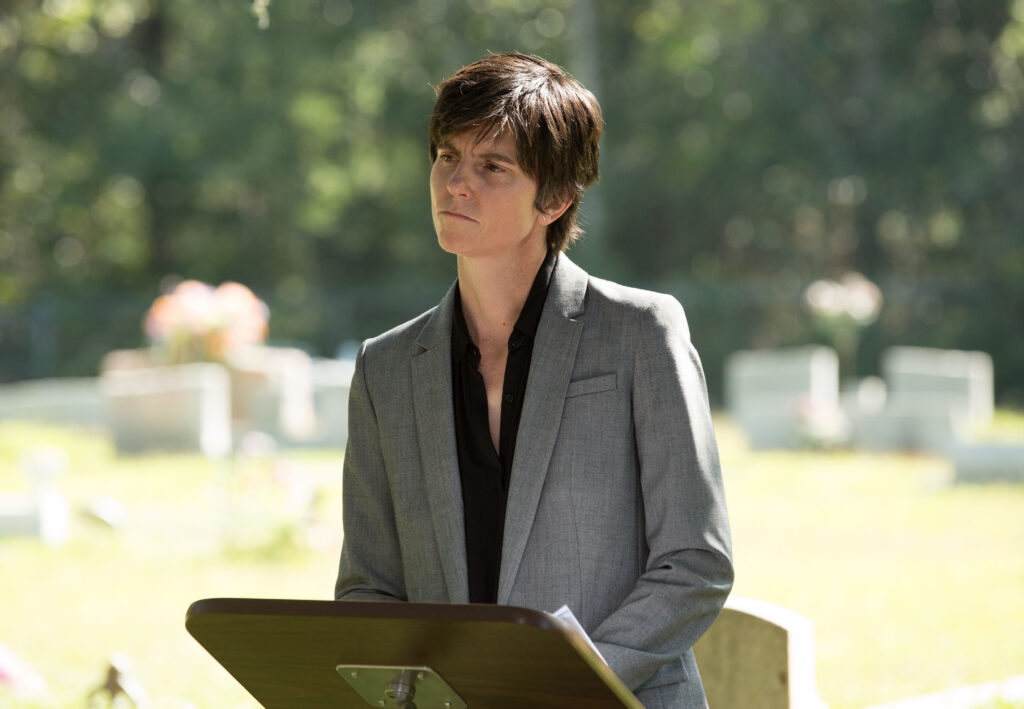For a storyteller as singular as Tig Notaro, her new Amazon series “One Mississippi” is a bit too familiar. It looks and feels too much like self-important dramedies you can overdose on at Sundance, about artists from the city who come home to the suburbs to face mortality, their lives changed in the process. By no coincidence, the flaws are similar: Like with John Krasinski’s recent “The Hollars” and Chris Kelly’s opening-tomorrow “Other People,” the power of the inspired, personal experience is lost when the whole package is readily comparable, even if the actors are charismatic or the script is funny enough. But to be perfectly honest, “One Mississippi” has the advantage of simply having Notaro as its representative. When it comes to life experience, I’d rather listen to Notaro—a cancer survivor and comedian who is indeed from Mississippi—than practically anyone else in the room.
“One Mississippi” kicks off with an emotionally intense pilot, which labors under the positive definition of recognizable. Notaro plays a radio DJ named Tig who lives in Los Angeles, who ventures to the title state after her mother suffers a freak accident that leaves her on life-support. Along with her goofy brother Remy (Noah Harpster) and uptight stepfather Bill (John Rothman), Tig spends time with her mother in the hospital. The series even shows us the moment in which a family decides to take their loved one off life support, and then listen for them, over an uncertain amount of time, to stop breathing. Co-writers Diablo Cody & Notaro (who co-created the show) wrap up the episode with a tight bow after touching upon in flashback and dialogue what the mother and daughter did and didn’t say to each other before forever separated. It’s the best offering the show has from the four episodes I saw (out of six total this season), and it’s easy to see why Amazon viewers responded to the pilot so well, leading to a green-lit first season.
It’s not long into episode two that the writing of “One Mississippi” expresses a clear struggle in giving the TV treatment to what Notaro has previously talked about in her stand-up and the documentary “Tig.” There is a nice dynamic of a makeshift family with Remy, Bill & Tig living together after the funeral, but the narrative has little idea of what to individually do with the men (Bill’s cat runs away, Remy lives like a 15-year-old) while Tig sorts out her own mortality and relationships. Remy & Bill are a central product of the show’s low-key, spacious atmosphere, which goes both ways; it’s refreshing to see characters built so well by soulful performances and then given air to breathe, but on the other hand, “One Mississippi” is too undefined stylistically to strictly ruminate, or to put all narrative weight on Tig. A twist about Tig’s mother reveals itself in later episodes, as if to provide some sort of tension to a series that half-successfully eschews it.
When not carving out a sizably dark tone using jokes and offhand remarks about traumatic pasts, the writing tries to enhance the story with dreamlike imagination. Moments of Tig reflecting upon her life with flashbacks of her and her mother are more on-the-nose than needed; cartoonish daydreams or nightmares feel like inserts that ham up the tone. All of these digressions are then echoed in unscripted radio broadcasts that Tig records, as a young woman sound engineer listens deeply. Instead of achieving emotional revelation, these touches test the limits to which “One Mississippi” can feel overwritten.
The show’s appetite for big moments of cheese would register as completely dishonest if the writing didn’t feel so inspired and just poorly communicated. Whenever the story struggles to create jokes from dormant plotting, it can always focus on its core truth, that of Notaro’s invaluable life perspective. The show echoes Notaro’s famous 2012 “I have cancer” stand-up set with no-bullshit references to real life medical conditions (including constant bathroom usage) and makes for dramatic moments with a single actress that are unprecedented. One episode’s subplot involves her refusal to look at her naked body post double-mastectomy; the staggering climax is when we share in the character’s self-reveal as she stands in front of a mirror, the moment uniquely articulating (and without manipulation) a life-changing episode of learning to love one’s self.
Though the anonymous look of the series doesn’t express it, you can often see in arresting, sincere moments throughout “One Mississippi” why Notaro wanted to make this show, and with such an albeit recognizable log line. Mortality is about much more than death when your lead character is a living, breathing, joking version of a survivor ready for what’s next.












